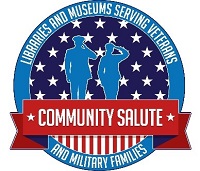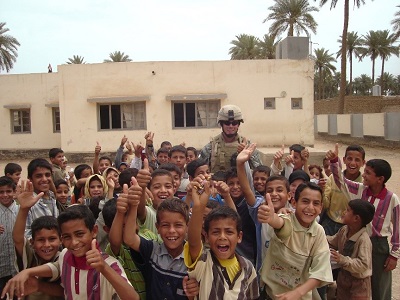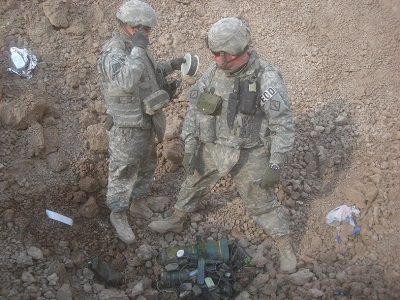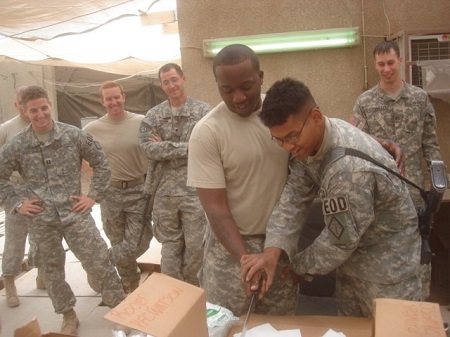Blog Posts | November 7, 2016
Share This
Editor’s Note: In September, IMLS announced a cooperative agreement with FSG to strengthen the ability of libraries and museums to fulfill the unique and critical needs of veterans and military families. Through the Community Salute program, IMLS will gather information from a variety of key stakeholders in the library, museum, and military communities; identify opportunities for enhancing community services; and develop frameworks, tools, and resources to strengthen the role libraries and museums have in addressing the specific needs of veterans and military families. This is the latest in a series of Community Salute blogs highlighting the role that many libraries and museums already play in the lives of veterans and military families.
By Dr. Steve Maxner
Texas Tech University
Veterans Day is a time when our nation shows its appreciation to those who have answered the call to serve. An important way we show our thanks and build our understanding of their unique experiences, is to collect and preserve the history of our veterans and to give voice to the complicated and fraught life in combat.

From previous generations of veterans, like those who served in Vietnam, we are still receiving traditional manuscript materials, such as boxes filled with photographs, slides, documents, diaries, maps and other materials. Sometimes we have the privilege of watching an 8-mm film that shows what life was like on a combat base or we get to listen to the voices of a veteran and their family as they exchange audio letters via reel-to-reel recorders, trying to provide each other with reassurance, comfort and hope at a time of unbearable loneliness and uncertainty. These are important and rich materials that help us better understand the human toll of war, and remind us of the incredible costs to our veterans, their families, and our nation.
Working with the millennial veterans of the more recent conflicts in Iraq and Afghanistan provides a different set of challenges that might place at risk a significant part of that history. With this most recent generation of veterans we are encountering a much larger percentage of born-digital material such as digital images, videos, correspondence and other forms of communication. Given the ephemeral nature of digital files, we are concerned that much of their story will be lost in the coming years and decades, unless we work with veterans to preserve those digital materials today.
Through a generous planning grant from IMLS, the Archive of Modern American Warfare at Texas Tech University has conducted research into the issues involved with collecting and preserving born-digital materials from younger veterans. We have surveyed and collected information from veterans around the country to determine the amount of digital material they possess, and the ways in which we might work with them to collect and preserve those materials now. This has also included looking at developing a digital upload or transfer system that might make easier the task of collecting their materials, like basic information about the veteran, where they served, their years of service, and all of the necessary information to create an archive collection for them.

By far, the greatest challenge we have encountered is an apparent lack of interest on the part of many young veterans to participate in the preservation of their legacy of service. Some of the obvious reasons we believe include the basic demands of life as veterans leave military service and go to school, get jobs, and start families. This is actually quite consistent with our experience with Vietnam veterans who did very much the same things upon returning from war, and it is during the past 15-20 years that they have become more and more involved in preserving their history.
But the challenge remains: the younger generation of veterans today has a large percentage of materials that require our immediate attention if we hope to preserve their legacy of service and sacrifice to our nation. The question is, how do we convince them that the time to act is now?
As part of our IMLS program grant, we attempted to collect information from millennial veterans about the types of materials they have and their interest in and willingness to preserve their digital collections using an online uploading system. We sent a survey to nearly 600 veteran groups, associations, and related organizations across the U.S. and received a rather modest response. Still, we are heartened by some of the responses and know that, while only a small percentage of millennial veterans seem interested in doing this now, they realize that it is important and will be interested in doing so at some point in the future. When asked whether they would be willing to use an online system to upload their digital material to a digital archive that would be fully searchable online, some respondents replied favorably.
“Eventually, maybe. It's still too soon for me, even ten years removed from the war in Iraq.” - Carlos Alvarado (San Antonio, TX)
“Yes. It is so important that we compile these digital artifacts for future generations.” – Joy Hewitt (Stafford, VA)
“Yes. I don't feel the photos I took are phenomenal, nor particularly interesting. The same goes for letters I wrote home, items I brought back, etc. However, I covet and am amazed by, everything preserved from generations of warriors that deployed before me. Just in case future generations have this same drive, I believe it's important to preserve our experiences for those who may one day follow in our boot steps.” – Dennis Harris (Lubbock, TX)

Though survey responses so far have been minimal. We are encouraged, and our current plan is to continue to develop our Archive of Modern American Warfare to include an online uploading system so those veterans who are ready now will be able to go online and donate their collections whenever they want. We will also continue to advertise and raise awareness about the importance of veterans doing this now while they still have access to the rich personal materials currently stored on their laptops, phones, removable media, and other digital storage devices.
Perhaps the most important thing we hope to accomplish, however, is to launch a national campaign to raise awareness about these issues and to find a recognizable and respected national spokesperson who can help us draw attention to this. Without raising awareness on a national level and prompting action now, we fear we will lose an important part of the history of U.S. veteran service in Iraq and Afghanistan.
Fifty years ago, U.S. veterans returned from a war in Vietnam to a nation who did not immediately value their service and sacrifice. Most of them sought to forget about the war, put away their uniforms, photos, and other materials, and simply got on with their lives, going back to school, getting jobs and starting families. Luckily, the stuff they put in those boxes all those years ago is still there, and they are now donating what they have to archives like the Vietnam Center and Archive at Texas Tech, and they are helping us to better understand those events.
With their born-digital materials, our millennial veterans don’t have the luxury of time.
About the Author
Dr. Stephen Maxner is director of the Archive of Modern American Warfare, which is currently developing under the wings of the Vietnam Center and Archive, also at Texas Tech University. Dr. Maxner can be reached at steve.maxner@ttu.edu
All photos Courtesy of the Archive of Modern American Warfare at Texas Tech University.
